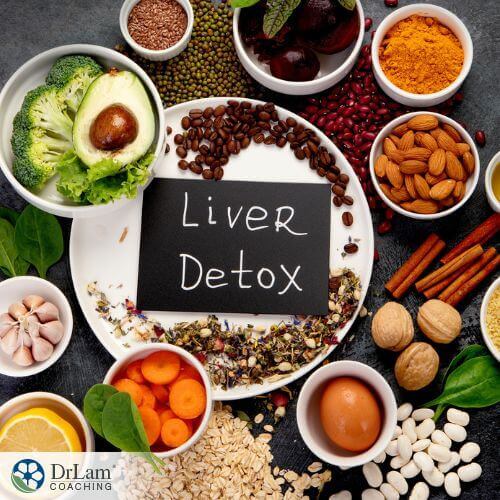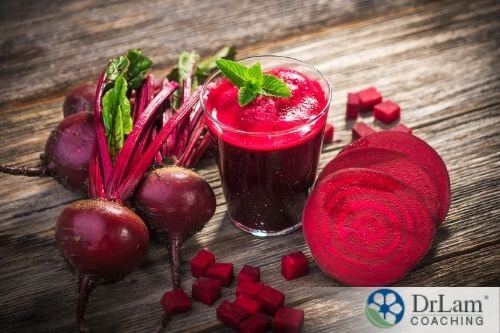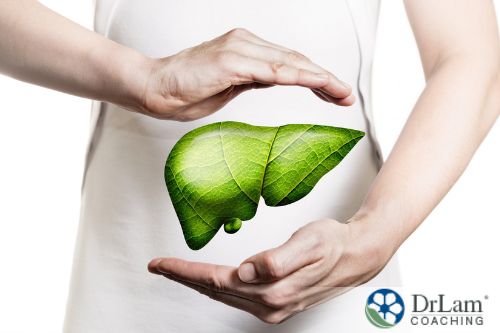Considering a liver detox? The liver performs over 500 essential functions in your body. So, when it’s unhealthy, there’s no way that you can feel and perform at your best. It makes sense to give your liver some TLC. However, there's a lot of controversy about whether liver detoxes are the best way to do this. Proponents say doing a detox can rid you of toxins and even help you lose weight. But these detox protocols also have dangerous downsides. Here's what you need to know to support your liver safely.
 Liver detoxes have become very trendy in certain alternative medicine circles. Proponents argue that the liver accumulates toxins when it filters them out of your body, and that these toxins can build up and cause symptoms and health conditions.
Liver detoxes have become very trendy in certain alternative medicine circles. Proponents argue that the liver accumulates toxins when it filters them out of your body, and that these toxins can build up and cause symptoms and health conditions.
However, there is little evidence to support this idea. You can damage the liver through lifestyle choices like drinking large amounts of alcohol or taking high doses of ibuprofen long-term, but if you are generally healthy, then your liver should be able to filter out toxins without taking damage.
If you’re thinking about doing a liver detox, then you’ll notice that there’s lots of advice and guidance online. Most liver detoxes include some if not all of the following strategies:
However, if you have liver damage or failure, then this is a serious health problem, and you need to see your doctor immediately. This is too serious an issue to rely on liver cleanses to resolve. But if your liver is generally healthy, then doing these kinds of detoxes probably isn’t necessary. And it has other downsides as well.
You may be considering doing a liver detox because you believe that your liver is unhealthy. When your liver is unhealthy, it means that your body will struggle to filter out toxins. This can cause a range of symptoms like:
However, if you have many of these symptoms, then it's critical that you visit a doctor first, before trying a liver cleanse. They will be able to identify if there’s any serious liver damage and get you help before it impacts your quality of life.
There’s a lot of controversy about liver detoxes. Some people swear by them, but others claim that they can be dangerous.
The liver naturally detoxifies itself and the rest of your body. It does this by cleansing the body of toxins and by producing bile to boost digestion. What this means is that unless you have liver damage, your liver doesn’t need help to cleanse itself. And following a harsh liver detox may actually negatively impact your health in the following ways:
Certain strategies used in detox can be dangerous to your health. For example, enemas can damage the intestines if not used correctly, causing long-term and life-threatening damage.
Many detoxes include restrictive diets that may not offer all the nutrition that your body needs. Over time, this can cause deficiencies, particularly in children and people with other medical conditions.
No matter what anyone might say, a liver detox cannot replace medical treatment for a damaged liver. If you think something may be wrong with your liver, then see your doctor. Don’t try to use a liver cleanse to ‘fix it’ and risk letting serious issues go untreated.
 Many detox diets are hard to follow and restrictive. This can cause stress that you just don’t need, particularly if you’re already feeling unwell.
Many detox diets are hard to follow and restrictive. This can cause stress that you just don’t need, particularly if you’re already feeling unwell.
There are lots of liver detox programs out there promising to improve your health and your liver function. These can be extremely expensive and include long lists of supplements, herbs, or other things that you need to buy.
Many liver detox regimes promise to boost the metabolism and aid with weight loss. However, this isn’t usually what happens. These types of liver cleanse diets are often very low in calories, which can slow the body’s metabolism. This makes the body think it is starving and causes any weight you lose to return once you start eating normally again.
If you’re feeling unwell, then a harsh liver detox isn’t the answer. However, you can support the health of your liver with healthy lifestyle changes. These changes need to be long-term and added gently to your routine, to avoid stress and to ensure that your body responds well to them.
With that in mind, there are some things to avoid or cut down on if you want to cultivate a healthy liver. You should avoid:
There are also strategies you can adopt that will reduce your risk of liver damage and help your liver perform its natural functions properly. Strategies to help your liver include:
If you eat a healthy diet, one that’s full of fruit, vegetables, and other whole foods, then it will naturally make your liver healthier. However, there are some foods that are better for your liver than others, so you should try to eat more of them if possible.
Just remember that everyone’s body is different. So, if you have a bad reaction to a food, then don’t try to force yourself to eat it just because it’s good for your liver. You need to find an eating regime that you can sustain long-term and that supports whole-body health, and the best way to do that is with natural, organic foods that you enjoy and that make you feel good.
With that in mind, let’s take a look at the foods that may support liver health:
Green tea contains high levels of an antioxidant called catechin, which has been shown to help improve liver function. This may be why, in a Japanese study, 5-10 cups of green tea a day was associated with improved blood markers of liver health. Green tea does contain caffeine, so be careful with your intake.
 Beetroots help break down toxic wastes so they can be excreted quicker and help cleanse the blood. They also contain lots of vitamin C and fiber, which naturally improve the functioning of the digestive system.
Beetroots help break down toxic wastes so they can be excreted quicker and help cleanse the blood. They also contain lots of vitamin C and fiber, which naturally improve the functioning of the digestive system.
Organic olive, hemp, and flaxseed oil are full of healthy fats that may help lower fat levels in the liver.
Garlic contains selenium, which helps to boost antioxidant enzyme levels in the liver as well as sulfur, which helps your liver flush out toxins. This makes this tasty herb a very good addition to a liver-friendly diet.
Cruciferous vegetables contain glutathione, which helps trigger toxin cleaning enzymes in the liver. They also help encourage glucosinolate production in your body, which can further boost toxin flushing. You can enjoy these benefits by eating vegetables like:
This yellow spice has received a lot of attention lately because of its anti-inflammatory effects. Turmeric also helps the liver flush out toxins, detox metals, and contains antioxidants that help repair liver cells.
Eating fruit on a daily basis is a great way to support your overall health. And if you want to give your liver extra support, make them citrus fruits. These fruits support healthy digestion, stimulate liver function, and help turn toxins into harmless, water-soluble substances.
A dysfunctional liver is often a part of Adrenal Fatigue Syndrome (AFS), which is characterized by multiple dysfunctions throughout the body. This condition is caused by chronic, ongoing stress. When you’re stressed, the NeuroEndoMetabolic (NEM) Stress Response activates, causing the release of cortisol from your adrenal glands. The high cortisol levels activate some functions in your body and shut down others, preparing you for a life-threatening situation.
But chronic stress is a long-term, sometimes a lifelong problem. It causes the NEM stress response to stay active over long periods, leaving the adrenal glands to become fatigued from the heavy workload. This causes multiple organs and systems in the body’s circuits to become dysfunctional. This includes the Detoxification Circuit, which consists of the liver as well as the immune system and extracellular matrix (ECM).
Liver congestion in particular is a key problem in AFS that can cause lifelong health risks. Here are some symptoms you may experience if your liver is sluggish:
However, this doesn’t mean that you should do a liver detox, as this can be problematic when you have AFS.
 One of the most important duties of the Detoxification Circuit and its three components is to rid the body of toxins including metabolites. These are toxic substances that are produced through metabolism. Basically, when your body breaks down substances, it produces metabolites. Typically, this work is done in the background, without your awareness. But when you have AFS, this process can start to malfunction.
One of the most important duties of the Detoxification Circuit and its three components is to rid the body of toxins including metabolites. These are toxic substances that are produced through metabolism. Basically, when your body breaks down substances, it produces metabolites. Typically, this work is done in the background, without your awareness. But when you have AFS, this process can start to malfunction.
This is partially due to liver congestion and how the liver detoxes. There are two phases of liver detoxication. Phase 1 involves fifty liver enzymes known as the cytochrome P450 enzyme system and they’re responsible for reducing the toxicity of pollutants. This phase also produces glutathione, which is used as part of Phase 2.
During Phase 2, special detoxification processes such as methylation, sulfation, and glutathione conjugation occur. This phase occurs because the metabolites produced in Phase 1 can be extremely toxic and must be deactivated and eliminated.
When these two phases occur in balance, detoxification is smooth and easy. But when they become unbalanced because of AFS and liver congestion, a liver detox can be very dangerous for one important reason: retox reactions.
When you’re otherwise healthy, a liver detox may make you feel tired for a while, but with rest, you will recover. However, when you have AFS, it can cause a retox reaction. This can occur most often in people who are in stages 3 or 4 of AFS and have severe imbalances in the liver and its detoxification processes.
Instead of feeling tired for a while and then recovering, you may experience extreme reactions to the detox. This can occur in response to the release of more metabolites during the detox process, further overwhelming the body, and because of the massive congestion of the liver and ECM. Imbalances in the body’s natural detoxification processes, namely the two phases of detoxification, can make it impossible for your body to get rid of the overload of metabolites. It can even result in the creation of even more dangerous metabolites as the result of Phase 1 detoxification, which then aren’t deactivated by Phase 2 because of malfunctions. These can then flood the liver along with any metabolites still stored in the ECM, resulting in worse congestion than before the detox.
This can be a very dangerous situation, leaving your overwhelmed body in a worse state than it was in before the liver detox. That’s why, if you have AFS or liver congestion, it’s so important that you work with a physician who’s aware of AFS to design a holistic recovery program that doesn't make your health worse.
A harsh liver detox might do more harm than good. Often these types of detoxes are filled with harsh and temporary dietary changes. This type of regime may easily leave you feeling tired and more stressed than before, without doing much for your liver.
The best way to actually support liver health is by making better lifestyle choices. These include drinking plenty of water, eating more fruits and vegetables, and making sure you are getting some liver-supporting foods in your diet. Also, make changes that become part of your lifestyle rather than temporary ones.
For more strategies on improving and supporting your liver health, you can talk to our team at +1 (626) 571-1234 or click here.
Harsh diets and detoxes can be very hard on your body. That’s why, if you’re thinking of doing a liver detox, you should do it in a safe, gentle way. This will help support and improve the health of your body without causing your body additional stress.
